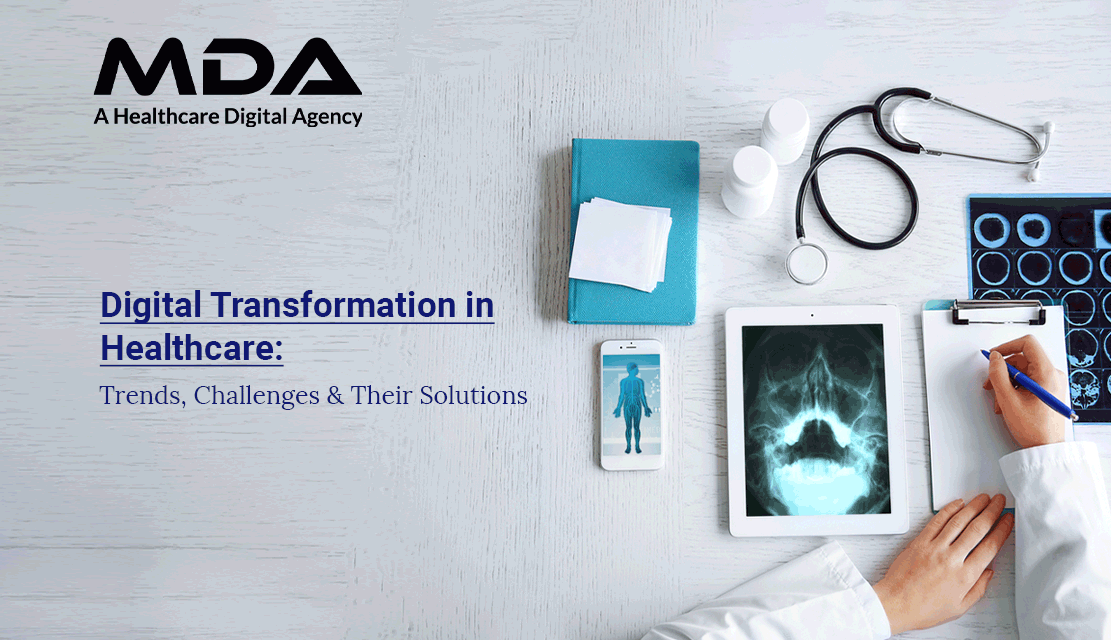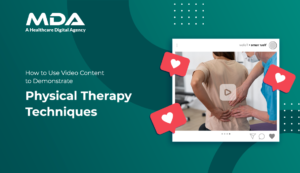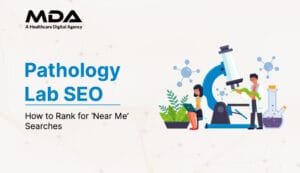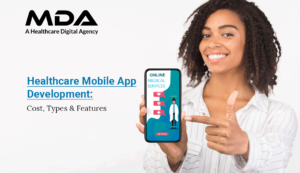Change is happening fast, and it is all driven by digital transformation.
Change not just about making things more convenient, but also about making things better. Digital transformation is sweeping through every corner of our lives, changing the way we work, get information and even how we interact with services.
The healthcare sector, a fundamental part of our lives, is no exception to this digital revolution.
In this blog, we are going to take a deep insight into the ever-evolving world of healthcare and digital transformation. We will explore the most current healthcare digital trends, the challenges they bring and the smart solutions that are driving the industry forward.
Healthcare and Digital Transformation
Digital transformation in healthcare means using the latest technology, smart methods and innovative ways of doing things to make sure that everyone gets the best possible care.
In the past, you had to go to the doctor, and you would wait for hours just to get a quick checkup. Now, with digital transformation, things are getting a whole lot smarter.
According to experts at Deloitte, nearly 92% of healthcare professionals and healthcare centers are already seeing the benefits of this change. We are taking a giant leap forward in the way we look after our health.
This blog is all about understanding this transformation in healthcare. We are here to explore how digitalization is changing the face of healthcare for the better.
Whether you are a patient, a healthcare professional or just someone interested in the future of healthcare, we have got you covered.
Let’s dive into the world of healthcare and digital transformation, where innovation means better health for everyone.
1. Benefits of Digital Transformation for Patients:
- Better & More Personalized Services:
Digital transformation means the care you get is all about you. Consider it as a doctor who knows you inside and out. With the help of advanced technology, you can now get more accurate health diagnoses and treatment plans designed just for you. This personal care is all about making you feel valued and heard.
- Better Communication with Doctors:
By going digital, your doctor is just a click away. Imagine being able to talk to your healthcare provider from the comfort of your home. Video calls, chats and instant treatment strategies are at your fingertips. No more waiting in long lines, no more hassle.
- Easy Access to Personal Health Data:
Your health information is in your hands. You can access and manage your health records whenever you want, wherever you are. This is all about understanding your health, your body and your well-being. With digital transformation, your health metrics are your daily guide to better living.
- Convenient Appointment Scheduling:
Your time is precious, and digital transformation respects that. You can now schedule your doctor’s appointment at your convenience. No more waiting for hours in a crowded clinic. You are in control of your schedule and your health.
- Real-Time Health Metrics Tracking:
Imagine having a personal health assistant with you 24/7. Health wearables hold the key to good health. They allow you to track your important health metrics in real-time. You feel like you have a mini doctor right on your wrist, helping you make informed decisions about your health. This is not just technology, this is your path to a better life.
2. Benefits of Digital Transformation for Healthcare Institutes/Organizations
- Reduced Costs:
A digital transformation in healthcare doesn’t just mark the beginning of a change, instead, it also marks the beginning of a revolution. It is about doing more with less. Automation of processes cuts operational costs and makes healthcare services more affordable. The goal is to simplify a complex solution so that it runs smoother, faster and without any hiccups, making the whole process run efficiently.
- Optimized Workflow:
The paper trail is a thing of the past. With digital records, everything is at your fingertips. Your healthcare provider can access your records in seconds, reducing the time you spend on the examination table. It is smoother, quicker and much more efficient.
- Improved Interaction with Patients:
Digital transformation is bringing a new level of innovation to patient care by opening a new chapter. The interaction between healthcare providers and patients is no longer limited to the confines of the clinic. Through video calls and chats, communication is improved and your concerns are addressed more effectively. In other words, it is about bringing healthcare to your home at your convenience.
- Secure Database for Electronic Medical Records:
Your data is precious and healthcare organizations know it. With digital transformation, a secure database is created to safeguard your medical records. Essentially, it is like a digital vault where your health history is protected. Your data is safe, accessible to healthcare professionals and private.
3. Benefits of Digital Transformation for the Healthcare Industry
- More Effective Internal Communication:
The healthcare industry thrives on communication. With digital transformation, communication between all healthcare stakeholders becomes more efficient. The entire team works together to provide you with the best care.
- Better Time Management:
Healthcare is a time-sensitive industry, and digital transformation takes that into account. This is like having a 24/7 access pass to your health records. Quick access and real-time coordination save precious moments, potentially saving lives. Making every second count is what it is all about.
- Improved Healthcare Services:
Healthcare is all about you. Digital transformation allows for various technologies to come together, providing personalized and effective treatments. It is all about offering the best care possible, tailored to your unique needs. We are not only going through a time of change, but we are also going through a time of a healthcare revolution.
With these benefits in mind, let’s explore some of the top healthcare digital transformation trends that are shaping the industry’s future:
Top 7 Healthcare Digital Transformation Trends
1. Empowering Patients with Health Wearables
- Monitoring Vital Health Metrics:
Health wearables are your personal health companions. They allow you to keep an eye on your health metrics, like heart rate and activity levels, whenever you want. These portable devices are like having a tiny doctor on your wrist, helping you stay informed about your health.
- Booming Market:
Wearable health devices are becoming increasingly popular. In fact, the market for these devices is expected to reach an impressive $74 billion by 2026. This is a technological revolution that will benefit your health. The popularity of these gadgets is on the rise and they are sure to remain in demand.
- Real-Time Data:
Health wearables provide real-time data, which means you get instant updates on your health. As well as being useful for you, this data is also very important for healthcare professionals. They can use this information to make accurate assessments and take quick actions when needed.
2. Patient Portals: Your Gateway to Better Care
- Transparency and Convenience:
Patient portals act like your health control center. They let you access your health records, book appointments and talk to your healthcare providers. No more manual record sharing or long waits. Ultimately, it is all about making your healthcare experience smoother and more engaging.
- Improved Patient Engagement:
In many ways, patient portals are more than just data management; they are about the patient too. You can check your medical history, prescriptions and even your test results online. You are in control, and you can easily share this data with multiple healthcare providers. The goal is to put the power in your hands.
3. Data Aggregation: Bringing It All Together
- A Comprehensive View:
Healthcare institutions have tons of data coming in from different sources – from lab results to patient records. Data aggregation puts all the pieces together. This comprehensive view helps healthcare providers make better decisions and reduces your waiting time.
4. Telehealth & Virtual Doctor Visits: Healthcare Just a Click Away
- Virtual Doctor Visits:
Virtual doctor visits have become a game-changer, especially after the COVID-19 pandemic. You can chat with your healthcare provider through video calls, saving you time and avoiding crowded waiting rooms.
- Efficient and Convenient:
These virtual visits are super convenient, and they save you the hassle of traveling to the clinic. The best part is that healthcare providers can see more patients efficiently, making healthcare services more accessible.
5. On-Demand Healthcare: Your Health, Your Way
- Changing the Game:
The on-demand economy has arrived in healthcare. You are not limited to a single organization anymore and healthcare providers can adapt to your needs more easily.
6. Disease History Analysis: Tailored Treatment for You
- A Personalized Plan:
Healthcare tools for disease history analysis serve as a means of telling the story of your health. They dig into your medical history and create a personalized treatment plan just for you. The goal is to get the right care at the right time, improving your health outcomes.
7. AI Screening
- Priority Care:
AI-based screening can be compared to having a nurse on call 24/7. It helps prioritize patient care and guides you to the right place. Whether it is setting up an appointment, going to the lab or picking up your medications, AI is there to assist.
- Reducing Burden on Hospital Staff:
AI takes some of the workload off hospital staff, making your healthcare journey smoother. Chatbots and voice systems make sure you get the right care at the right time. The goal is to reduce waiting times and make your experience more efficient.
Healthcare Digital Transformation Challenges
While the potential benefits of digital transformation in healthcare are significant, the road ahead is not without challenges.
Let’s explore some of the major obstacles and how to overcome them:
- Challenge – Data Security Concerns
Data security is a primary concern in healthcare due to the sensitive and valuable nature of patient data. Cyberattacks can lead to breaches of privacy, fraud and disruptions in patient care.
Solution – Leveraging Blockchain in Healthcare
Adopting blockchain technology is highly recommended to enhance data security. Blockchain can prevent cyber breaches, ensure data integrity and give patients control over their health information. This technology is gaining traction in healthcare, with revenues expected to exceed $890 million by 2023.
- Challenge – The Cost Factor
The cost of digital transformation can be a barrier for healthcare organizations. Many focus on the initial investment without considering the long-term benefits.
Solution – Emphasize Value Proposition
While healthcare digital transformation requires initial investments, it also offers scalability, increased revenue and more profits in the long run. By focusing on the value proposition and long-term benefits, healthcare organizations can overcome the cost challenge.
- Challenge – Resistance to Change
Healthcare professionals often resist change due to busy schedules and reluctance to learn new software.
Solution – Educate Stakeholders and Staff
Creating a comprehensive training program and demonstrating respect for stakeholders’ time can help overcome resistance to change. Providing clear deadlines, advance notice and opportunities for feedback can facilitate the transition.
- Challenge – HIPAA Regulations Compliance
HIPAA regulations mandate the protection of personal medical records and health information.
Solution – Partner with HIPAA-Compliant Software Development Companies
Building HIPAA-compliant software is complex and requires expertise. Partnering with experienced healthcare software development companies ensures compliance with regulations and data security.
How MDA Can Help
At MDA, we are an ISO-certified healthcare website design and development company and bring over a decade of experience in developing healthcare software solutions to the table. As a healthcare app development company, we have a track record of building HIPAA-compliant software, ensuring data security and regulatory compliance. If you are planning to take the plunge into digital transformation for your healthcare company, consider reaching out to our expert team at MDA for a smooth and cost-effective experience.
Final Thoughts
In recent years, digital transformation has dramatically changed the face of healthcare, offering benefits for patients, healthcare organizations and the industry as a whole. From improved patient care to streamlined operations, the potential is immense.
The top healthcare digital trends, from health wearables to AI screening, are reshaping the way healthcare is delivered.
While healthcare digital transformation challenges exist, including data security, cost, resistance to change and compliance with regulations, solutions are available to overcome them.
Adopting digital transformation is no longer an option but a necessity in the healthcare industry and it is time for healthcare organizations to embrace the future and ensure the well-being of patients and the industry’s growth.If you have any questions or need guidance on your healthcare digital transformation journey, feel free to reach out to us for assistance.

Meet Nandini Pathak, our tech-savvy content writer who adores dogs. With SEO proficiency, she crafts engaging content in the world of technology. Her curiosity drives her passion for learning and growth. Whether she’s writing about the latest trends or simplifying complex ideas, Nandini’s love of technology is clear. Her words not only inform but also resonate. With every piece she creates, she blends her expertise and enthusiasm, making technology accessible and exciting for all.







